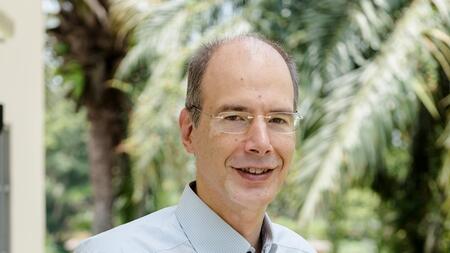New process allows tailor-made malaria research
Model of infection from Tübingen successfully tested in Africa: volunteers are being infected with malaria parasites in a controlled manner - New findings on naturally acquired immunity and resistance to malaria
Scientists at the Institute of Tropical Medicine of the University of Tübingen, the German Center for Infection Research (DZIF), and of Sanaria Inc. have developed an infection system that allows malaria to be studied directly on humans: Volunteers are being infected with malaria parasites in a controlled manner. The method has now been used for the first time in a clinical study at the Center de Recherches Médicales de Lambaréné (CERMEL) in Gabon to investigate the naturally acquired immunity to malaria and the effect of the sickle cell gene. Carriers of the sickle cell gene are known to have natural resistance to malaria and develop less frequent severe malaria. The findings appeared recently in the American Journal of Tropical Medicine and Hygiene.
Every year, more than 200 million people fall ill with the tropical disease malaria, predominantly in Africa. The causative agents are parasites, so-called plasmodia, which are transmitted by mosquito bites. The symptoms of malaria include high, recurrent fever, which alternates with fever-free phases, chills and gastrointestinal discomfort. In children under five years in particular, the disease often leads to death.
"People who are repeatedly infected with malaria parasites can acquire a natural immunity to the disease, this is well known," explains Professor Peter Kremsner, Director of the Institute for Tropical Medicine in Tübingen and coordinator of the Malaria research unit at the DZIF. "However, the understanding of the underlying mechanisms is still incomplete."
To investigate the mechanisms of the natural resistance to sickle cell disease and immunity to malaria, the research team used the controlled human malaria infection (CHIM) system developed by the Tübingen and the Sanaria teams, in a study conducted in Gabon, Central Africa: Volunteers were given one dose of Sanaria® PfSPZ Challenge, which contains the malaria parasite Plasmodium falciparum. The research team was thus able to examine the infection rates and symptoms of adults with and without the sickle cell gene. People who are exposed in Gabon to the malaria pathogen throughout their lives are regarded as "semi-immune" as adults.
In total, eleven semi-immune Gabonese with normal hemoglobin and nine semi-immune Gabonese with the sickle cell gene were injected with malaria parasites. Additionally, five European non-immune controls with normal hemoglobin received one dose. Subjects were followed closely for 28 days after injection and a blood sample was taken daily from day five. At the end of the study, all volunteers received a malaria medication to stop the infection.
As expected, naturally acquired immunity to malaria prolonged the time to the onset of the parasites in the blood. The volunteers either fell ill later, or did not fall ill at all. In volunteers with the sickle cell gene, this time was delayed even more. Interestingly, significantly fewer malaria cases were found in the group of volunteers with the sickle cell gene.
"The study results provide new insights into how naturally acquired immunity to malaria works," says Dr. Bertrand Lell, Director of CERMEL "The findings provide us an approach to investigating the mechanisms by which naturally acquired immunity and sickle cell trait reduce the impact of malaria, and developing interventions like vaccines that mimic them."




